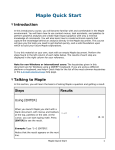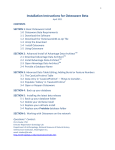Download Mathematical Problem Solving
Transcript
Math Applications: Video Games (MATH110) Fall Term 2014 MW 7:05-8:45, Old Main Lab Professor: Patrick M. Kelly Office: 402 Old Main Phone: 824-2174 E-mail: [email protected] Emailing will always be the best way of contacting me. Please feel free to email me any time, and I should typically be able to get back to you within a few hours. Note: Also, though, if you’re emailing me for any reason other than turning in an assignment, please do not include an attachment. I have a rule established in Outlook that will send any email directly to a different folder (not my Inbox) if the message has an attachment and is coming from a student in this class. I keep very current on the emails in my Inbox, but I typically won’t even look in those other folders until I actually sit down to grade projects. If you’re trying to email me to ask a question and you would need me to look at your file, simply email me an attachment-less message first and explain your question, and then send a second email with the attached file. The second message will go directly to my /MathApps folder, but the first message will nag at me in my Inbox so that I know to look in my other folder for your file. Also: Always compress/zip your files when you send them to me. Office Hours: Mondays: 1:00 – 3:00 Wednesdays: 1:00 – 3:00 Fridays: 1:00 – 3:00 Meeting times by appointment may be arranged as well. Other Information: This course is registered on Blackboard, an academic software package set up on one of Mercyhurst’s servers. You may access information about the course via Blackboard at any time from any computer. Please check that the e-mail address listed for you on Blackboard (most likely your Mercyhurst account) is the account that you use regularly; please change it on Blackboard if this is not the case. Text: 3D Math Primer for Graphics and Game Development (second edition), by Fletcher Dunn and Ian Parberry, CRC Press Publishing, ISBN 978-1-56881-723-1 http://www.crcpress.com/product/isbn/9781568817231 Needs: A compass, and a ruler or other straightedge Mathematics Applications Courses, Description: Through the analysis of a single area of mathematical application, such as art, music, or politics, we will see how fundamental and traditionally studied mathematical elements are found in the underlying structure of problems, solutions, relationships, and works of expression and creativity. Once familiar with the mathematical building blocks of a certain area of application, the students will then synthesize these into an original contribution of their own, which may be a mathematical description of a phenomenon, a solution to a problem, a work of art, etc., depending upon the particular area of application. Students will find a number of ways to be successful in the class, including through presentation, homework and quizzes, projects, and examination. Specifically, we will discuss functions, graphs, trigonometry, probability, statistics, and logic. Particulars for this Section: In an effort to explore the mathematics used in the making of video games, we will look at the geometry and algebra of 2D and 3D space. We will look at the mathematical standards used to describe objects in 2D and 3D space, and the positions, orientations, and trajectories of such objects. While the focus of the lessons and assessments will be on the mathematics, it is worth noting that a substantial side effect of these lessons is that the student will gain some rudimentary skills in the craft of making their own video games. Course Objectives: The students will acquire a significant subset of precalculus-level mathematical skills, hence improving their critical thinking, especially with regard to logic, abstraction, attention to detail, and demand for precision. Furthermore, the students will gain experience in mathematical analysis and consequential creative synthesis into original observations, solutions, or works of expression. Statement of Support for the Mercy Mission This course supports the Mercy Mission by creating students who are intellectually creative. This is achieved through fostering critical habits of the mind, which support the aspirations for excellence manifested within the academic community. In particular, the student will achieve this by synthesizing course materials to produce an original application. Statement of Core Curriculum Fulfillment MATH110 is a course in the Scientific, Quantitative, & Critical Reasoning category of the Core Curriculum of Mercyhurst University. Evidence of this course’s alignment with the proper Core student learning outcomes is provided as the last page of this syllabus. Grading: Your final course grade will be compiled from several factors. Seven homework assignments, seven quizzes, two in-class exams, an assorted amount of projects, and the cumulative final exam will all be considered for the course grade calculation. The point distribution amongst these factors will be as follows: Seven Hand-in Homework assignments, 10 points each = 70 points Seven Quizzes, 20 points each = 140 points Exam #1, 100 points Exam #2, 100 points Projects, 100 points Final Exam, 140 points Total: 650 points Course grades will be determined using the following scale: A 608-650 points (93.5-100%) B+ 582-607 points (89.5-93.4%) B 543-581 points (83.5-89.4%) C+ 504-542 points (77.5-83.4%) C 452-503 points (69.5-77.4%) D+ 419-451 points (64.5-69.4%) D 387-418 points (59.5-64.3%) F 0-386 points (0-59.4%) Hand-In Homework Suggested Exercises Homework: Homework in a mathematics class is a must! Our authors have an exercise set at the end of each chapter, designed to test your understanding of the mathematical concepts covered in that chapter. As “Suggested Exercises,” I will typically be assigning the entire exercise set from each chapter (I’ll specify at the time if there are any exceptions to this). In addition, I will give you some supplemental problems as Suggested Exercises, when the authors’ exercise set could use some bolstering. All Suggested Exercises are your responsibility to do and understand. Do what it takes to make sense of how to work through these problems—see me, email me, find extra help online, etc. Seven Hand-in Homework assignments will be given throughout the term as well, each worth 10 points toward your final course score. It will always be announced in advance what will be due—and when—for a Hand-In Homework assignment (i.e., there will be no surprises, so you should be able to put forth the appropriate effort to earn most, if not all, of the points for these assignments). The content of the Hand-In Homework assignments will be either identical to some of the Suggested Exercises or will be very similar to them. Hand-In Homework assignments will be announced well in advance of when each is due. Late submissions will not be accepted. Quizzes: Quizzes will be used as an assessment of your understanding of the material and your progress in the course. Quizzes will be held seven times during the term, each as a “pop quiz.” (To be frank, this is intended to determine who is keeping up with the Suggested Exercises.) Material for the quizzes will come directly from the Suggested Exercises. Making up a missed quiz is highly improbable, and is only considered when notice is given prior (when possible) to the missed quiz, there is a valid reason for missing the quiz, and the quiz is made up before to the next class session. Projects: There will be several Projects assigned for a grade, mostly taking the form of a program you will complete on the computer using either the GameMaker or the Unity software. These Projects are intended for you to demonstrate your understanding of how the mathematical concepts learned in class are incorporated in a video game. Realize that these Projects are intended to test your mathematical ability much more so than your programming ability. The guidelines, templates, and demonstrative examples should assist you on how to code the commands for the Projects that are to be completed on the computer. For further assistance on the technical aspect of coding in either GameMaker or Unity, refer to the respective help libraries (the user manual for GameMaker or the Scripting Reference for Unity). The points the individual Projects will be worth will vary, totaling 100 points by the end of the term. For each of these Projects, there will be guidelines to follow to ensure that you demonstrate your understanding of the relevant concepts from the course. Also, though, you will always be encouraged to infuse your own creativity into these Projects . . . so don’t just follow the guidelines; there will be points awarded for appropriately creative elements included in your Projects. Academic Integrity: Mercyhurst University believes that academic integrity is a core principle of education. According to the Center for Academic Integrity (www.academicintegrity.org), academic integrity begins as a commitment to five fundamental values: honesty, trust, fairness, respect and responsibility. These values begin with the individual and extend to others in the community of learning. Academic integrity should not be an issue in this course if we all embrace the values of honesty, trust, fairness, respect and responsibility. The danger in a course such as this—as is the case with the majority of courses in which you submit projects completed on the computer—is to give in to the temptation to share files. For any assignment that earns a grade, you must do your own work and turn in your own files. Attendance: You are expected to attend every class session. If you do miss a class—for any reason— it is your responsibility to catch up on what was missed. Please do not expect me to re-teach the material that was taught on the day you were absent. Services: Learning Differences In keeping with college policy, any student with a disability who needs academic accommodations must call Learning Differences at 824-3017 to arrange a confidential appointment with the Disability Services Director during the first week of classes. Cell Phones: Before each class session begins, please try to remember to turn your phones off so as not to cause a disruption during class (and do realize that even the sound of a vibrating phone can be disruptive). Furthermore, cell phones are not permitted at all during exam situations (quizzes and tests). The Computer Lab: Are you mature enough to be in a class that’s held in a computer lab? Please resist the temptation to constantly check email, Facebook, ESPN.com, or other such distractions that sitting at a computer can present. Realize that much of what I have to show you in this course are things that I have to show you—typically on the overhead screen. If you’re not paying attention while I’m demonstrating something, do not expect me to explain it to you once you’re done doing your own computer work. (Tentative) Course Schedule: Day Sect. Wed, n/a 8/27 Material Intro to the course Single linear equation in one variable; An introduction to GameMaker Mon, Chp 1 9/1 §1.1; Cartesian Coordinate Systems 1D Mathematics; 2D Cartesian Space 3D Cartesian Space §1.2; §1.3 Wed, §1.3; 9/3 §1.4 3D Cartesian Space; Odds and Ends Mon, n/a 9/8 Concepts from Geometry Compass-and-straightedge constructions Wed, n/a 9/10 Some Geometry of Pathfinding; Pathfinding and AI Mon, Chp 2 9/15 §2.1; Vectors Mathematical Definition of Vector, and Other Boring Stuff; Geometric Definition of a Vector; Specifying Vectors with Cartesian Coordinates; Vectors versus Points §2.2; §2.3; §2.4 Wed, §2.5; 9/17 §2.6; §2.7; §2.8; §2.9 Negating a Vector; Vector Multiplication by a Scalar; Vector Addition and Subtraction; Vector Magnitude (Length); Unit Vectors Mon, §2.10; 9/22 §2.11; §2.12 Wed, §2.12; 9/24 §2.13 Mon, Exam 9/29 #1 Wed, Chp 3 10/1 §3.1; 3.2 Mon, §3.3 10/6 The Distance Formula; Vector Dot Product; Vector Cross Product Vector Cross Product; Linear Algebra Identities Chapters 1 and 2, and geometry material Multiple Coordinate Spaces Why Bother with Multiple Coordinate Systems? Some Useful Coordinate Spaces Basis Vectors and Coordinate Space Transformations Wed, 10/8 Mon, §3.4; 10/13 §3.5 Wed, Chp 4 10/15 §4.1; Midterm Break—no class! Nested Coordinate Systems; In Defense of Upright Space §4.2 Introduction to Matrices Mathematical Definition of Matrix; Geometric Interpretation of Matrix Mon, §4.3 10/20 The Bigger Picture of Linear Algebra Wed, Chp 5 10/22 §5.1; Matrices and Linear Transformations Rotation; Scale; Orthographic Projection §5.2; §5.3 Mon, §5.4; 10/27 §5.5 Reflection; Shearing Wed, §5.6; 10/29 §5.7 Combining Transformations; Classes of Transformations Mon, Exam 11/3 #2 Wed, Chp 6 11/5 §6.1; 6.2 Mon, §6.3; 11/10 §6.4 Chapters 3, 4, and 5 More On Matrices Determinant of a Matrix; Inverse of a Matrix Orthogonal Matrices; 4 x 4 Homogeneous Matrices Wed, §6.5 11/12 4 x 4 Matrices and Perspective Projection Mon, Chp 7 11/17 §7.1; Polar Coordinate Systems 2D Polar Space; Why Would Anybody Use Polar Coordinates? §7.2 Wed, §7.3; 11/19 §7.4 Mon, 11/24 Wed, 11/26 Mon, Chp 8 12/1 §8.1; §8.2; §8.3 3D Polar Space; Using Polar Coordinates to Specify Vectors Thanksgiving Break—no classes! Rotation in Three Dimensions What Exactly is “Orientation”?; Matrix Form; Euler Angles Wed, §8.4; 12/3 §8.5; §8.6; §8.7 Mon, 12/8 Fri, 12/12 at 6:00 Axis-Angle and Exponential Map Representations; Quaternions; Comparison of Methods; Converting between Representations Reading Day—no classes Final Exam Everything! MATH 110 – Math Applications: Video Games, Fall 2014 Patrick M. Kelly Assistant Professor of Mathematics and Computer Systems [email protected], math.mercyhurst.edu/~pkelly This course has been approved for the Mercyhurst University Core and fulfills a requirement in Core Area V. The following explicates the Core Learning Outcomes that are associated with this course and how they will be assessed as part of the Core requirements. Core Learning Outcomes and Assessment Strategies The table below highlights the Student Learning Outcomes associated with every course in Core Area V - Scientific, Quantitative, and Critical Reasoning. Primary Learning Outcome Quantitative and Scientific Reasoning Learning Objective Associated Assessment Use mathematical concepts to make logically sound decisions, judgments, and/or predictions; effectively use scientific inquiry and reasoning to solve problems and analyze and interpret data. Supporting Learning Outcome Supporting Learning Outcome Quantitative conceptual evaluation, issued online to all student enrolled in an relevant course Critical Thinking Creative Thinking All Core Student Learning Outcomes are assessed on a rotating basis of at least once every three years. All assessment documents and information including the scoring rubrics can be found on the Mercyhurst portal and website. Please direct questions to the course professor or to the Core Assessment Coordinator – [email protected]. Course Learning Goals and Objectives The following course objectives detail how the specific content of this course will support the above Core Outcomes. Acquire a significant subset of precalculus-level, hence improving critical thinking skills, especially with regard to logic, abstraction, attention to detail, and demand for precision. Further, gain experience in mathematical analysis and consequential creative synthesis into original observations, solutions, or works of expression.

















